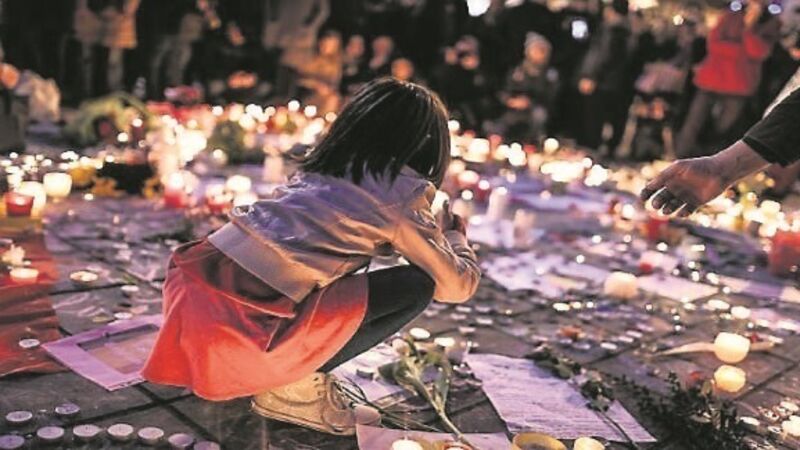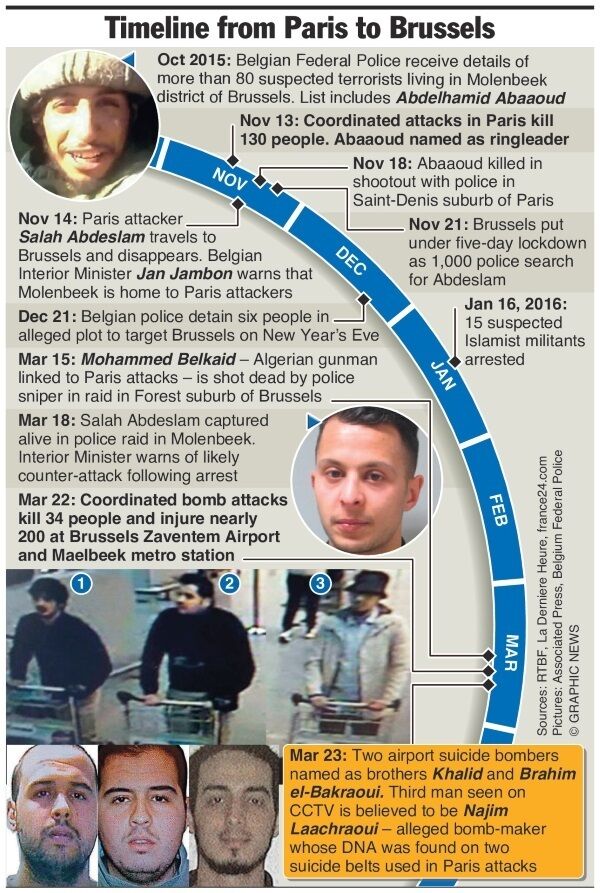Belgium remains on alert amid raids on properties

Prosecutors identified two of three suicide bombers as brothers Khalid and Brahim El Bakraoui as they searched for the fourth man in a cream-coloured coat caught on security cameras who escaped from the airport after placing a bomb that didn’t go off.
Following the attacks, police discovered their bomb-making hideout in northern Brussels along with a testament written on a computer by Brahim El Bakraoui that he was “frantic, not knowing what to do, being hunted everywhere”, federal prosecutor Frederic Van Leeuw told reporters.
Belgium kept its terror alert at the highest level as police raided houses in Brussels looking for clues and suspects. Following two attacks on civilians in Paris last year, the Brussels murders exposed the inability of European security services to track the sheer number of suspected Islamic radicals.
Germany, up to now spared a large-scale attack, said it has identified 450 dangerous Islamists. Many European-born radicals have spent time in Syria undergoing terror training by the IS, which claimed responsibility for the Brussels atrocities.
Brahim El Bakraoui, 29, was one of three airport check-in counter attackers, while his brother, Khalid Bakraoui, 27, blew himself up on a subway car heading downtown from a station a short walk from EU headquarters. The Brussels-born brothers, both Belgian citizens, had an “extensive criminal record, but not related to terrorism,” Van Leeuw said.
The third suicide bomber, at the airport, wasn’t named. Prosecutors also didn’t identify the suspect seen leaving the departure hall alive. Belgian media earlier identified him as Najim Laachraoui and announced his arrest, only to retract that report later.
Laachraoui left for Syria in 2013 and was stopped on the Austria-Hungary border last September while travelling with Salah Abdeslam, who was arrested last week as a suspect in the Paris massacres in November that left 130 people dead, prosecutors said previously.
The failed airport bomb packed the most explosive power and didn’t go off until later, after passengers fled and the army’s disposal experts moved in to disable it.

Bomb-making materials found at a house in the Schaerbeek district of Brussels included 15kg of TATP, 150 litres of acetone, 30 litres of hydrogen peroxide, detonators, a bag of nails, plastic trays, tools and ventilators, prosecutors said.
Belgian media reported that the lethal paraphernalia was left behind because the terrorists ordered a minivan from a local taxi service and had to make do with the smaller saloon that was sent to pick them up instead.
The hastily typed testament by the elder brother was found on a computer in a nearby rubbish bin. It fuelled suspicions that last week’s capture of Abdeslam led the attackers to speed up a plot already being hatched.
Valls, the French prime minister, also called on the European Parliament to pass legislation to enable the tracking of air passengers within Europe.
“We have to turn the page on naive optimism,” Valls said. Even on high alert, authorities can’t be expected to prevent all the terror attacks being hatched in their midst, Belgium’s interior minister said.
“We are fighting against professionals,” the minister, Jan Jambon, told RTL radio. “Sometimes we have situations like yesterday. Zero risk doesn’t exist.”
IS claimed responsibility for the atrocities. The airport explosions occurred well outside the security cordons for departing passengers, and like most cities Brussels has no security checks at Metro entrances. It’s not easy to see how either type of location could be better protected, security experts say.
External checkpoints at airports, for example, would just present a new target.













